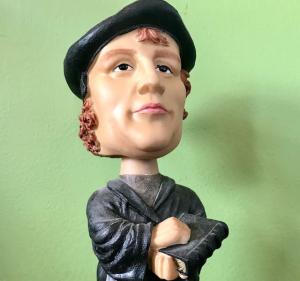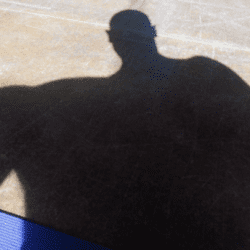Buckle up fellow Bible Geeks. A small word that packs a whallop.
A Call to Prayer, Action, and a New Understanding of Faith.
“Managing the Waves” Transcript of a Message shared on 6/24/18 at Father Dyer UMC Breckenridge, CO & a modified version at Nederland Community Presbyterian Church on 8/26/18.
On that day, when evening had come, he said to them, “Let us go across to the other side.”And leaving the crowd behind, they took him with them in the boat, just as he was. Other boats were with him. A great windstorm arose, and the waves beat into the boat, so that the boat was already being swamped. But he was in the stern, asleep on the cushion; and they woke him up and said to him, “Teacher, do you not care that we are perishing?” He woke up and rebuked the wind, and said to the sea, “Peace! Be still!” Then the wind ceased, and there was a dead calm. He said to them, “Why are you afraid? Have you still no faith?” And they were filled with great awe and said to one another, “Who then is this, that even the wind and the sea obey him?” – Mark 4:35-31
I sometimes like to think of what I’m going to do here in preaching a sermon as peeling an onion and we’re going to peel some layers of an onion together. This passage of scripture is a baffling one in many ways. We’ve got this massive storm. We’ve got seasoned fishermen and sailors who are truly panicked and freaking out – and that’s gotta be quite a storm for them to be freaking out! And then they wake up Jesus – “Master Wake up there’s a storm! …. Dude! Are you going to sleep through this?! Don’t you care?!” They finally rouse him and he says, “Peace, be still. Why are y’all afraid? Do you still have no faith?”
It’s a little hard for maybe most of us, I’ll say me, to fathom this kind of experience. I’ve not come across that kind of experience in my life. Wow! I mean WOW! That would be something to experience. You couldn’t dismiss it. Some Christians minimize the miracles. “Yeah, that sort of stuff was just fables – they didn’t really happen.” Okay, you could do that. Or you could accept it as story – a story for us to read ourselves into. I like that. Or you could say that it really did happen! There’s all kinds of ways you can take this. A common way would be to say, “Well, Jesus can do things we can’t do. When in trouble, Jesus can intervene and save the day.” “Who is this that even the seas obey him?” “Well, Jesus is somehow God or son of God, or he is Emmanuel – ‘God with us.’ He’s Yeshua, which literally translates to ‘God saves’ – and this would seem to be an example of it. God saves.”
You can go back to Psalms 107 where it talks about God stilling the storms, stilling the waves, and this reminds us of that, Jesus stilling waves. All right, so “Jesus is somehow God, and Jesus can do things we can’t do, and Jesus can save the day.” We can all go home with that. That’s a possible takeaway, sure, okay. But I think there’s more.
A second layer of the onion to look at is to ask, “What was going on in the community of the early Christians when the gospels were being written?” We’re looking at the Gospel of Mark, so at least 30 years after Jesus died. So what was going on in that early Church? What kind of storms would they have been experiencing? Well, at that time, they were being persecuted. They were being persecuted by the Roman Empire. They were having conflicts and divisions with their fellow Jews in Israel and all sorts of inter-family chaos and strife. That’s a stormy rough sea to be in, and wouldn’t those be great words of assurance for a community in that kind of a situation to be reminded that “Jesus will calm the waves of life. Jesus has got this. Hang in there.”
Okay, that’s an interesting piece to ponder. Yet, maybe there’s a third layer of the onion to peel. This is one I find pretty interesting. That first question, “Who is this that even the seas will obey him?”, that’s a question that I think many pastors focus on. Probably most. “Who is this?” – and it’s all about Jesus. Jesus as special. Jesus as God. Okay, but then Jesus brings up a question which I think we should listen to if Jesus is bringing it up – “Have you still no faith?” Have you still no faith? I think that might be the question to focus on. It’s coming from Jesus. Have you still no faith?
It could be that there’s a hint in that question that maybe, just maybe they didn’t even have to wake Jesus up during that storm at all! Maybe they could have dealt with things themselves! Huh?! Well, Jesus later said in John 14:12, “You will do greater things than these.” Talking about his own miracles, he says to his disciples, you will do greater things than these. Hmm. Jesus did some pretty great things. That’s a little hard to fathom. What’s going on there?
 I’m going to jump forward to Paul’s letter to the Romans. This is the last letter that he wrote. In Romans 1:17, he says, “The righteous will live by faith.” The righteous will live by faith. A little later, he talks about how the righteous live by faith in Jesus Christ. Now, we come to that understanding from our friend Martin Luther. Martin Luther, a great hero of the faith in a Protestant church and all of this, we care about Luther. His translations of Romans have affected the translations that are in most of our Bibles today. Fine.
I’m going to jump forward to Paul’s letter to the Romans. This is the last letter that he wrote. In Romans 1:17, he says, “The righteous will live by faith.” The righteous will live by faith. A little later, he talks about how the righteous live by faith in Jesus Christ. Now, we come to that understanding from our friend Martin Luther. Martin Luther, a great hero of the faith in a Protestant church and all of this, we care about Luther. His translations of Romans have affected the translations that are in most of our Bibles today. Fine.
But sometimes little words matter. There’s a difference between of and in. Dr. Bernard Scott is an expert biblical scholar who I heard speak at a forum in California. He suggests that Luther might’ve got it wrong in just a teeny little way. If we look at Gal 2:16, 2:20 and Romans 3:22 and 3:26,
“The debate hinges upon the translation of a simple two-word Greek phrase: pistis Christou. It concerns a technical point of grammar, and so it might seem as though scholars are making a great deal of fuss over such a small matter. The stakes, however, are high—both for our understanding of Paul and for Christian theology in the wake of the Reformation. In short, if the Christou in pistis Christou is an objective genitive (“faith in Christ”), then Luther was right and Protestant theology since Luther has generally been on the right track so far as this issue is concerned. If, however, the Christou in pistis Christou is a subjective genitive (“the faith/faithfulness of Christ”), then Luther got it all wrong, and Protestant theology since Luther has generally been on the wrong track. Thus, the difference between “faith in/faithfulness to Christ” and “Christ’s [own] faith/faithfulness” is important because it goes to the very root of one of the major issues that sparked the Protestant Reformation.”
Dr. Scott argues that the best interpretation of the Greek, and it’s a compelling case, is that it’s not faith in Jesus Christ, it’s faith of Jesus Christ. We’re saved by the faith of Jesus Christ.
Now, that’s a curious thing. What could that mean? If that’s true, somehow it’s either that Jesus’ faith in God ripples out and affects all the rest of us vicariously; or maybe he models for us having faith, a life of faith. He models it for us and shows us what it’s like to have a true life of faith, showing us that faith, and if we can tap into that faith, then we too have salvation. We too are saved. Interesting thing to ponder. It’s an interesting thing to, it’s really, really, really interesting. You can geek out on that. It could even lead to divisions of denominations. Sometimes back in the day Christian churches would divide about those kinds of things!
I’m kind of a “both/and” person. Why does it have to be either/or? Maybe there’s something of value here and here. Let’s work with this. The faith of Jesus Christ. There’s a saying that maybe you’ve heard, “Pray as if everything depends on God. Act as if everything depends on you.” Perhaps not a bad way to live a life. You could have faith and still do your part and show up. And maybe it’s a little bit of both. Having faith, as praying and acting simultaneously. I do a lot of that. Praying as I’m taking action. Maybe you’re the same way. The theme of this might be to get involved, to participate in life. So it’s not just having faith and praying to God, it’s actually getting involved. Putting that faith in action, putting that prayer in action as we come across situations and needs.
So, okay, back to the storms. Back to weather. I’ve done a lot of weddings, around 90 at this point in my career. A lot of them have been outdoor weddings. And not all of them were on sunny days! But with most all of them the rain was kept at bay for the 30, 40 minutes of the ceremony. And you know the families were praying! A I offer a little prayer. I don’t like pray to God to be like my bell boy in the sky. But you know, “God, if it’s possible, can we just have some calm here for a good 30 minutes?” Seems like it worked most of the time. I don’t know what to say about that.
Now there can be some theological and moral problems here. If this farmer is praying, and the farmer next door isn’t, and this farmer gets rain and that farmer doesn’t.., Wait! That doesn’t quite seem how prayer really works. That theologically gets a little weird. But I can tell you that it didn’t rain on most of those weddings.
And then there’s parking spaces. Maybe sometimes you have a parking angel that you appeal to as you’re pulling into downtown and you’re trying to find that parking spot in the meter or whatever and you got rock star parking! It’s right in front. That happens enough times and you’ve got a parking angel or you’ve got, I don’t know. But I have sort of seen that. Yeah, I’ve seen it.
I will tell you this. It’s really easy for us to think of ourselves as largely unable to interact with the world around us and make any difference. It’s really easy to think of ourselves as kind of impotent, like we’re just a pawn, we’re just a nobody and not much, we can’t do much, what can I do? It’s really easy. And it’s easy to put Jesus on a really high pedestal and say, “Well, that was Jesus. I can’t do that!” ..Of course Jesus would be saying, “Well, yeah, follow me, you can do that!”
And we do it with saints. Maybe the Methodist Church doesn’t have a whole lot of saints in the Catholic sense of things, but we do have All Saints Day and we think of all of us as being able to be vessels of grace and love and help inspire a life of faith in other people. We celebrate the saints. There are Methodist churches named St. Andrew or St. Mark, etc., there are those churches. It’s part of our lineage, our heritage. It’s really easy to say, “Well, that was a saint. That was St. Francis. That was Mother Teresa. That’s a special person. I can’t do that. That’s one of those unique, special, freaky people that’s not really one of us, that’s an angel on earth, that wasn’t really a human!” We put people on a pedestal and then we absolve ourselves from having to do much.
Dorothy Day was a great Catholic layperson and she’s in the process of being canonized, that’s the word for it, as a saint in the Catholic church. She started the Catholic Worker movement. She died in 1980 and she did most of her work in the ‘40s and 50s and early 60s. She worked with homeless folk and did a lot of social justice work. And now she’s being made a saint. Now she knew in her dying years that, that might happen to her. And she said, “Do not make me a saint. I will not be dismissed that easily!” I think what she meant by that was if you do this, you’re going to put me on a pedestal and you’re going to take all of my work that I’m trying to get others to be doing and you’re going to make them not feel so empowered to do it because I’m so special. That’s the last thing she wanted. We’re all so special is what she wanted us to think. We’re all so special!
You’ve probably heard this old preacher’s quip before. There’s this town being flooded. The police are going around town, driving around in squad cars, announcing “Everybody flee, everybody evacuate. Go to high ground. Everybody leave now!” And there’s this one guy saying “No, I’m not going to go. I’m praying to God!” Then all of a sudden, the flooding’s getting up to the first floor windows of the houses and the sheriffs are going around now in boats cruising around saying “Everybody flee, we got to go, got to go, got to go!” And the guy just goes up onto his second floor and says, “Nope! I’m just going to pray to God. God’s gonna take care of me!” Then the flood reaches up the roof and he’s on his roof and he’s praying to God. He’s praying with vigor. And then a National Guard helicopter comes by and drops a ladder and he says, “NO! I’m praying to GOD. God’s got this!” And then the helicopter goes off –and then he dies. He goes to heaven and he’s dismayed. He goes up to God, “God, what’s going on here? I was praying to you and I believe in you and I have faith in you and you didn’t save me.” “Well, I sent you a squad car, a boat, and a helicopter. What more did you want?!”
The fact is we need to get involved. God does the saving through us. We are the vessels! We are God’s hands and feet and voice in the world! We get to be. That is an honor – we get to be. We participate!
Now in my own life, I haven’t experienced a flood situation like that. I was in Boulder back in 2013, but I was in a pretty high hill during the flood. I was okay. Just helped bail out a lot of muddy basements. No, I haven’t run into a massive flood. But I did have a situation that was scary. I wasn’t in a boat that almost overcame with water, but I did have a scary experience. Life threatening even. I was a young chaplain in seminary, my first year at the Iliff School of Theology. I had my basic field education internship at the Englewood Federal prison in South Denver. One day that the chaplain there sent me on an errand. There were two people in the visiting room that needed a ride, Uber didn’t exist back then, up to a homeless shelter in Denver. So I said, sure, I’ll give them a ride.
So I gave this couple a ride in my old Jeep Cherokee up to Denver and they got to the shelter and the shelter apparently didn’t accommodate them because it was a man and a woman, a couple, and they wouldn’t accommodate them as a couple. They were going to separate them and they didn’t want that. So they wanted me to take them back to the prison. Okay. I drove him back to the prison. It’s a good 25 minute drive back down. Just as we were leaving downtown Denver, the fella’s sitting next to me and the woman’s in the back, he’s got his little duffle bag between me and him, and he opens up the duffle bag and pulls out a handgun. I realized right then – “Oh God. Crap. I’m about to get car jacked!” But I thought to myself, “You know what, no I’m not. Let’s try this.” So I pretended I didn’t see the gun. I just denied its existence and continued to conversing as if it weren’t there in his hand.
Now it was a stick shift Jeep Cherokee. I was able at each stop, at the stoplights, to make it seem that there’s something wrong with the clutch, there’s something just a little off about this car! And I made it seem harder and harder to operate the stick shift. As we were getting closer and closer to the prison, it became rather clear, this is not the kind of vehicle you would want!” I ignored the existence of the gun pointed at me, I continued in conversation as if that wasn’t happening, and I made it seem like my car was a pain in the butt to operate. I ended up dropping them back of at the prison, we parted ways, they looked bewildered, and that was that! The point is I was able to somehow prayerfully tap into some reserves, some creativity, some hope and faith that things are going to be okay.
Interesting. Maybe you’ve had a situation or experience that is somehow a little like that where you’ve been able to find some moxie, some insight beyond you that just showed up in the nick of time. You’ve all probably got some stories like that.
There’s another story that’s told that gets to the bigger picture. Let’s say this story takes place somewhere in Africa a century ago. There’s a fellow who’s been out hunting and he comes back with gazelle on his back. He arrives and he sees the villagers all scurrying around down by the river. They’re all down there and they’re pulling out children from the river. Little children drowning in the river. They pull them out and he drops down the carcass and he sees what’s going on and he joins them and he helps pull out more and more of these toddlers and infants in the river. They get all the children out – saving most of them.
Then the next day more children are floating down the river. And they all go out and everybody’s grabbing the little ones and pulling them out the river. And then at some point he stops and he walks away and he starts leaving. The villagers say “You can’t go! We need all hands on deck, we need everybody helping. Where are you going?!” He says, “I’m going to head upstream and see who’s throwing these kids in the river and put a stop to this!”
There are different ways we can take action. We can respond reactively in crisis moments, and we can also think about the bigger picture and what’s really going on deeper, at the systemic level. Right now our the nation is dealing with this immigration issue, and frankly not dealing with it so well. I don’t care which side of the issue you’re on, there’s an inelegance at a minimum happening. It’s an inelegantly handled situation. There are people fleeing from all sorts of terrible situations in Guatemala, Nicaragua, El Salvador, and they don’t necessarily speak English or Spanish. They speak rural folk languages. They don’t know much of anything about our politics. They just think their families will better off here.
There’s this notion that if the children are separated from them that it’ll be a warning and prevent others from coming up. Well, the warning isn’t getting to these rural people. They are leading life and death situations and hope beyond hope, hoping for some kind of better circumstance than what they’re fleeing from. They’re arriving and actually having a worse circumstance being separated from their own kids indefinitely. That’s a problem. Yeah, that’s not good. And it’s happening on our watch. So, we can be thinking about what can we be doing. What can we do? If we’re in this village together, what do we do?
Well, there’s different ways to respond. We could sign up to be foster families and start that process. We could try to appeal to people in power and change immigration policies in whatever ways seem right to us. We could think about what we’re doing as a nation that’s contributing to what’s going on in those countries that will be leading them to be having problems there to be fleeing from. We’re five percent of the world’s population in the US. We consume over a third of the world’s natural resources. That’s unsustainable. That’s problematic. We’re outsourcing toxic problems. We get our smart phones and cool gadgets and stuff – and we’re outsourcing the misery. The mining of those raw earth minerals, and the destruction and the harm and the exploitive cheap wages, we outsource toxicity in order to maintain our standard of living. That’s the stark cold truth. That’s reality. And it’s on our watch. We’re complicit.
So what can we be doing about that? I don’t know, I don’t have the answers. But I can invite a conversation. I can do that. This church congregation is in a time of transition. Specifically, you’ve got one pastor leading who’s been beloved and you’ve had great years with pastor Claire. You’ve got a new pastor coming in, and you maybe aren’t so sure about Calob. You’ve heard some nice things from me about Calob but you aren’t so sure. It’s a little scary. You’ve heaerd that this Conference of the United Methodist Church, the Rocky Mountain Conference, merged with the Yellowstone Conference and it’s become the Mountain Sky Conference and what does that mean to be a big new conference dang near the size of Alaska? What does that mean? Hmm, that’s a little scary. The unknown always is.
And then the entire denomination has got this ongoing challenge with, “Do we welcome and include all of God’s children including people who are seeking same sex marriages and such, or do we not include them?” After decades of lobbying, arguments, and strife, we’re still in the middle of that challenge and struggle. And on top of that, there are churches up here in the high country that have food pantries and outreach ministries to poor and homeless persons. Some people in those churches are thrilled about this … and others.. Not so much. There are people in the surrounding communities, fellow citizens, some of the neighbors around here who aren’t part of any church and some of them love these ministries to the poor – and others… not so much. They criticize them saying, “That’s enabling them! That’s coddling them! That’s just gonna mean more homeless people moving up here!” That perspective, that conflict is real folks. We’re trying to be the Church and people attack us when we step up and do it. And of course, also we feel all sorts of different tensions and conflicts in our own families – and in our personal relationships. You could say that we’re like the early Church in a time of turbulent, stormy seas. It’d be a pretty easy case to make.
So the lesson maybe of this story about Jesus in that storm is that Jesus can say and does say, “Peace. Be still.” And we can say, “Peace. Be still.” We can know that God’s got this. We can know that we’ve got this. We can know that each of us, we’ve got this – together.
Amen.
XX – Roger
p.s. Audio recording of the message
Video recording of a variation of the message at Nederland’
Rev. Roger Wolsey is an ordained United Methodist pastor and is the author of Kissing Fish: christianity for people who don’t like christianity
Facebook page for Kissing Fish

















